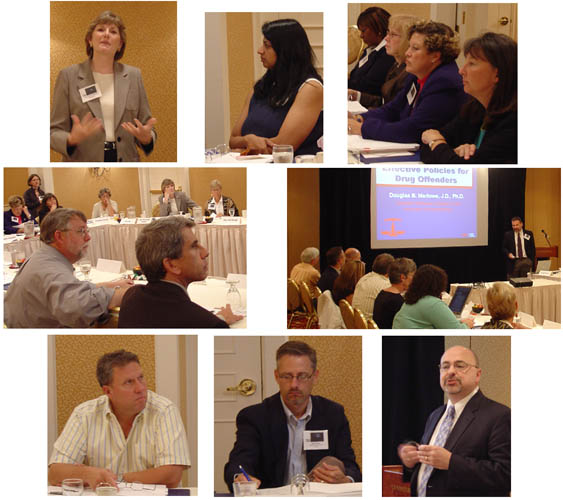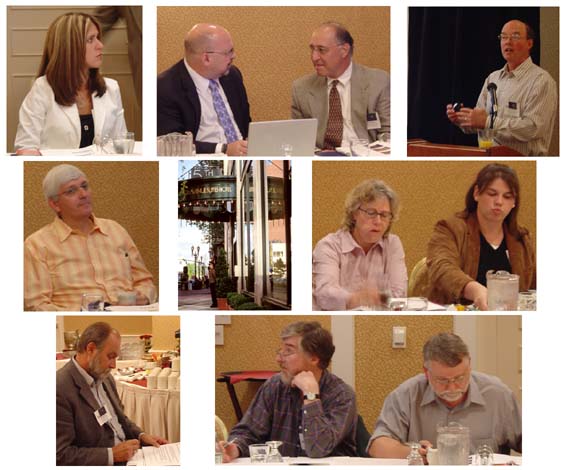John Britton
Principal Legislative Analyst
Oregon State Legislature
Salem, Oregon
Emalene
Correll
Research Associate
Kansas Legislature
Topeka, Kansas
Elisabeth
Donner
Fiscal Analyst
Washington State House of Representatives
Olympia, Washington
John
Dziedzic
Counsel, Senate Committee Service
Washington State Senate
Olympia, Washington
Jeff
Essmann
Senator
Montana State Senate
Billings, Montana
Joe
Flores
Legislative Fiscal Analyst
Virginia General Assembly
Richmond, Virginia
Pat
George
Representative
Kansas House of Representatives
Dodge City, Kansas
Kory
Goldsmith
Principal Attorney
North Carolina General Assembly
Raleigh, North Carolina
Laurie
Harding
Representative
New Hampshire House of Representatives
Lebanon, New Hampshire
Gwen
Howard
Senator
Nebraska Unicameral Legislature
Lincoln, Nebraska
|
|
Mattie
Hunter
Senator
Illinois State Senate
Springfield, Illinois
Stefanie
Loh
Associate Fiscal Analyst
New Jersey Legislature
Trenton, New Jersey
Sara
McEwen, MD
Research Consultant
Governor's Institute on Alcohol & Substance Abuse
Raleigh, North Carolina
Mary
Helen Roberts
Representative
Washington State House of Representatives
Lynnwood, Washington
Andrea
Russo
Fiscal Analyst
North Carolina General Assembly
Raleigh, North Carolina
Vicki
Schmidt
Senator
Kansas State Senate
Topeka, Kansas
Alexis
Senger
Chief Legislative Analyst
Colorado General Assembly
Denver, Colorado
Amy
Skei
Fiscal Analyst
Washington State House of Representatives
Olympia, Washington
Indu
Thomas
Staff
Counsel
Washington State Senate
Olympia, Washington
Maggie
Tinsman
Senator
Iowa General Assembly
Davenport, Iowa
|
On the history of drug abuse and addicition in the U.S.:
"This is a useful tool for understanding where we are
now."
"It was great to have this perspective."
"Great presentation. Wonderful historical perspective of the evolution
of substance abuse."
On
neuroscience and public policy:
"Excellent presentation - very interesting subject on
neuroscience/brain."
"Great information, a lot to think about! Reinforced treatment
of addiction as a chronic disease throughout!"
On
the public costs of substance abuse:
"Gave me great ideas and how the policies of a state may affect
this issue."
On
the effectiveness of treatment:
"Very useful information."
On
visiting a treatment center:
"This was one of my favorite parts. What courage these
individuals have. The director is passionate, along with his staff.
Wish all my colleagues could have seen this."
"Excellent, blew-up some of the myths around methadone. Very eye-opening
for me."
"It was nice to break up data-intensive presentation with this
visit. The panel was fantastic!"
On
personal reflections on addiction:
"After spending the day interacting with him, it was
a bit shocking and therefore very effective to hear his story."
"Another great break from data-heavy presentations. Helped to put
face on the 'chronic , relapsing' disease."
"I serve with Pat and never knew his story. He did a terrific job,
along with the visit to the treatment center, in putting faces to the
issue."
On
alcohol and the adolescent brain:
"I found this one of the most provocative of the workshops in terms
of the potential for marrying science and policy making."
"Would travel a long way to hear him again. Great facts and scientific
information. He knows how to distill this down for everyone's understanding."
On
effective policies for drug offenders:
"Great policy ideas to return home with. Appreciated the
time for questions at the end."
"Excellent and interesting presentation - well laid out, easy to
understand."
On
methamphetimine and its effects:
"Excellent presentation. Thanks for more neurophysiology! The presentation
again had some great take-home messages."
"Again, this is really fascinating information - reinforces the
reality that we are dealing with a disease with profound effects on
the brain."
|
|
On
the economics of treatment:
"Good material!"
On
investing in treatment to contain other costs:
"Useful information."
Overall
impressions:
"Exceeded my expectations! Great take-home messages and
ideas."
"The variety of programming was excellent, the programming was
excellent, loved the brain research components, great presenters."
"The well laid out and integrated presentations with the policy-relevant
focus were incredibly beneficial in obtaining a good foundational understanding
of drug and alcohol abuse and the multiple associated effects."
"Appreciated data on success of treatment and research to back
it up."
"I have a better understanding of the difference between abuse
and dependence and also the combination of brain function and psychosocial
functions."
"I view addiction as much more of a medical condition after attending
this conference."
How
participants think the workshop will help them with making policy regarding
substance abuse:
"Resources such as model legislation in Blueprint very
helpful."
"Evidence data is very useful - will improve quality somewhat;
will improve chances of passage significantly."
"This program will equip me with the latest data. I need to return
home, meet with administrators and other elected officials to put forth
progressive legislation to revise poor decisions made in the past."
"Not being a legislator, I can't comment. However I think I have
a better context to analyze legislation."
What
participants liked most about the workshop:
"Very
well organized. Material is absolutely a gift."
"Quality of data and presentations. Discussion with methadone clients."
"Science-based perspective, pointing us to quality resources, information
on drug treatment courts."
"The organized, well presented, and integrated presentations touching
upon the multiple disciplines involved with the population. The information
is applicable and digestible beyond what I had expected."
|
David Friedman, Ph.D.
Director, Addiction Studies Program for Journalists
Professor
Department of Physiology and Pharmacology
Wake Forest University School of Medicine
Winston-Salem, North Carolina Sue
Rusche
Co-Director
Addiction Studies Program for Journalists
Chairman, President, and CEO
National Families in Action
Atlanta, Georgia
A.
Tom McLellan, Ph.D.
Director, Treatment Research Institute
University of Pennsylvania
Philadelphia, Pennsylvania
Allison
C. Colker, J.D., Esq.
Program Manager
National Conference of State Legislatures
Washington, D.C.
Bonnie
Catone
Director of Communications
Treatment Research Institute
University of Pennsylvania
Philadelphia, Pennsylvania
Timothy
P. Condon, Ph.D.
Deputy Director, NIDA
Bethesda, Maryland
|
|
Douglas
B. Marlowe, J.D., Ph.D.
Director,
Section on Criminal Justice Research
Treatment
Research Institute
University of Pennsylvania
Philadelphia, Pennsylvania
Ted
R. Miller, Ph.D.
Principal Research Associate
Pacific Institute for Research and Evaluation
Calverton, Maryland
Kenneth
D. Stark, M.Ed., MBA
Director, Mental Health Transformation Project
Office of the Governor
Olympia, Washington
Ken
C. Winters, Ph.D.
Professor, Department of Psychiatry
Director, Center for Adolescent Substance Abuse Research
Univeristy of Minnesota
Minneapolis, Minnesota
Gary
Zarkin, Ph.D.
Director, Behavioral Health and Criminal Justice Research Division
RTI International
Research Triangle Park, North Carolina
|
Wednesday, September 13
8:00
Welcome and Introductions
Allison Colker
8:15
A History of Drug Abuse and Addiction in the U.S.
Sue Rusche
9:15
Can Neuroscience Influence Policy?
David Friedman
10:45
Break
11:00
Risky Business: Prevention Cuts, Public Costs, and Industry Profits
Ted Miller
12:30
Lunch
1:30
Substance Abuse Treatment: What Is It? Why Does It Seem Ineffective?
Bonnie Catone
3:30
Visit to a Treatment Center
6:30
Dinner
Speaker, Representative Pat George, Kansas
|
|
Thursday, September 14
8:00
Alcohol and the Adolescent Brain: Tastes Great, Less Functioning
Ken Winters
9:30
Break
9:45
Effective Policies for Drug Offenders
Doug Marlowe
11:15
Break
11:30
Methamphetamine: How it Influences the Brain and Behavior of Users and
Treatment Implications
Tim Condon
1:00
Lunch
2:00
Economics of Substance Abuse Treatment
Gary Zarkin
3:30
Break
3:45
Expanding Alcohol/Drug Treatment: An Investment in Health Care Cost
Containment and Public Safety
Ken Stark
4:30
Evaluations
5:00
Adjourn
|



